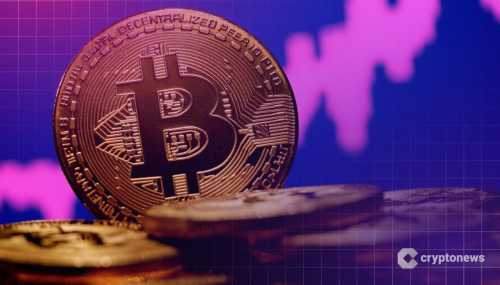Bitcoin ‘May Hit $135k’ and ‘Become Russia’s Super Currency’

A Russian expert claimed that Bitcoin (BTC) may hit $135k in 2025 as alt season kicks into gear, while a columnist said BTC was ready to become a “super currency” for Moscow.
The price claims came from Capital Lab partner Evgeny Shatov in a January 2 report from the newspaper Izvestia.
Bitcoin May Hit $135k by Summer – Expert
However, Shatov said that a slowdown may follow BTC’s next price ceiling, with a “consolidation” in the cards later in 2025. He explained:
“Bitcoin is making a smooth move into the distribution zone. And altcoin season is starting on the market. A range of scenarios are now potentially possible. But, most likely, the growth of the bitcoin price in the first half of the year will slow down.”
Russian officials warned of severe environmental damage as thousands of people came out to clean up tons of fuel oil that spilled out of two storm-stricken tankers (via AP) https://t.co/WNwaqj1nKx
— Bloomberg (@business) January 2, 2025
Shatov added that it was “quite possible” that BTC could “reach the $115-$135k mark,” after which “a period of consolidation is likely.”
The expert noted that the Bitcoin dominance index currently stands at almost 57%. But he remarked that this figure had only increased by 6.6% “since the beginning of the year.”
“Apparently, this phase has come to an end. And the index will continue to fall against the backdrop of an increase in the number of altcoins and growth in their total capitalization. For comparison: in 2017, this index fluctuated around 90%. And during 2021 it fell from 60% to 40%. As such, the market is gradually entering a phase of altcoin growth.”
Capital Lab partner Evgeny Shatov

A BitRiver-run crypto mining data center in Bratsk, Russia. (Source: PolitRussia/RuTube/Screenshot)
Bitcoin: Moscow’s ‘Super Currency?’
Meanwhile, there are further signs Moscow’s crypto pivot may continue into 2025.
In an opinion piece for the state-run media outlet RIA Novosti, the columnist Olga Samofalova wrote that in Bitcoin, Russia had “found itself a super currency.”
The bullish piece was accompanied by an AI-generated image portraying a Bitcoin token in a boxing ring standing on top of a fallen US dollar coin.
Samofalova wrote that in the wake of US-led sanctions packages, Russia now urgently needs “a currency for cross-border payments that no one can outlaw.”
Russian gas supplies to Europe via Ukraine stopped on New Year's Day, ending Moscow's dominance over the European gas market. The supplies came to a halt after Ukraine’s Naftogaz refused to renew its latest five-year transit deal with Russia's Gazprom https://t.co/67VPuVy2yX pic.twitter.com/HlO3KAAtn6
— Reuters (@Reuters) January 1, 2025
While she discussed some of the virtues of the digital ruble in this respect, the columnist ultimately concluded that the Russian CBDC “is tracked in the same way as the non-cash currency used today.”
“This,” she wrote, “means that the US can also harm settlements made in the digital ruble.” Samofalova continued:
“However, Bitcoin is a super currency in this regard. Bitcoin does not depend on the Russian Central Bank, or any other central bank, or on the policies of the US Federal Reserve or the White House. It is issued through mining according to a pre-established algorithm and without the intervention of any central bank.”

Inside a BitRiver-run crypto mining data center in Bratsk, Russia. (Source: PolitRussia/RuTube/Screenshot)
‘Bitcoin Has No Equal’
The columnist then noted that it was “impossible to track” transactions made in BTC and rhetorically asked:
“How can sanctions be imposed here? There’s no way. In terms of bypassing sanctions, Bitcoin simply has no equal.”
She conceded that BTC would not be a silver bullet for the Russian economy, writing: “It will be difficult for the state to control export-import operations in Bitcoin.”
But Samofalova claimed that Moscow has no better option than to put its faith in BTC, writing:
“Extraordinary and difficult times for the global economy call for non-trivial, high-risk measures. Russian oil exporters can continue to operate under sanctions due to the fact that oil tanker crews can turn off transponders and move invisibly. Bitcoin provides, in essence, the same thing. It renders the financial settlements of our importers and exporters with their friendly partners invisible. And therefore it makes them inaccessible to ill-wishers.”
G20 countries inflation rate.
🇦🇷 Argentina: 160%
🇹🇷 Turkey: 47.09%
🇷🇺 Russia: 8.9%
🇮🇳 India: 5.48%
🇧🇷 Brazil: 4.87%
🇲🇽 Mexico: 4.55%
🇳🇱 Netherlands: 4.0%
🇯🇵 Japan: 2.9%
🇿🇦 South Africa: 2.9%
🇦🇺 Australia: 2.8%
🇪🇸 Spain: 2.8%
🇺🇸 US: 2.7%
🇬🇧 UK: 2.6%
🇩🇪 Germany: 2.2%
🇸🇦 Saudi…
— World of Statistics (@stats_feed) January 2, 2025
Moscow Cagey on BTC Pay Details
Russian lawmakers have previously claimed they will not reveal the full details of their cross-border crypto pay operations to avoid attention from “unfriendly” nations.
The columnist, however, remarked that “difficulties” have “encouraged Moscow to steal a march on the rest of the world in approving, implementing, and developing new payment platforms” with “Bitcoin and other cryptocurrencies.”
“This new technological development has provided Russia with a tool to help it resist sanctions and dollar tyranny. Russian companies have already begun to use Bitcoin and other cryptocurrencies in international payments […]. However, the Russian authorities do not disclose how the process works in practice. Nor do they tell the public which companies are experimenting with Bitcoin in the payments space.”
Samofalova
Source: cryptonews.com



